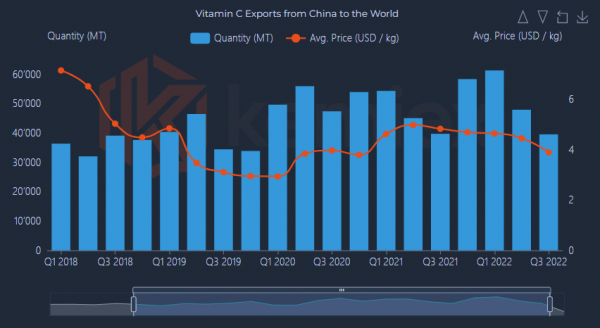DSM temporarily reduces vitamin C production in China

Continuation of usual output levels at current pricing is not sustainable, explained the vitamin producer.
Reducing the vitamin's output at the Jiangshan site would also support its objective of lowering its working capital, said DSM.
Production at its Dalry, Scotland facility will not be impacted, however. For finer grade pharmaceutical, food, and beverage applications, that facility will remain key.
"Higher input and energy costs have impacted global production across the industry. Cost margins for products made in China have been disproportionately affected by price levels below production cost," Stefan Scheuplein, vice president, water soluble vitamins, DSM, told us.
Vitamin C is not the only product in DSM’s network to be affected by market dynamics.
In November, the company announced it was halting Rovimix vitamin A production at its plant in Sisseln in Switzerland, for at least two months, with it citing higher energy costs as the reason for the shutdown. The pause button will be pressed in January 2023. Rovimix vitamin E-50 production will also be impacted due to the fact it has upstream infrastructure in common with vitamin A, added the producer.
DSM also revealed that month that it was forced to increase prices for its vitamin products manufactured in Europe.
Balancing material oversupply with lower demand
It is not surprising that large producers are starting to curb production to mitigate elevated margin pressure and to balance material oversupply with lower demand in 2022, commented Stefan Schmidinger, chief economist at Kemiex.
“In recent weeks, prices have gone as low as US$2.50-2.60 on CIF basis for larger orders, delivered to European or American ports. This is just over half of the price that could be realized in mid-2021, supported by the COVID-19 surge in demand, in the US for instance, and only slightly above the US$2.30 seen in previous troughs,” he said.
The question hanging over the market now is whether the big Chinese vitamin players such as CSPC, Luwei, NHU or others will copy such measures over the coming months, said the analyst. “Typically, mono-producers such as Luwei would be forced to stay in the market to generate cash.”
An extension of the Chinese New Year or the announcement of an annual maintenance shutdown for such companies for a few weeks is nothing out of the ordinary, however, remarked Schmidinger.
Price spikes, previous shutdowns
In 2018, DSM invested about €50m to upgrade its vitamin C facilities in Jiangshan to improve environmental performance and work safety. That year, vitamin C prices spiked to above US$10-15 per kg as stricter environmental policies in China in 2017 led to around 30% lower capacity. And DSM benefited, reporting a €415m one-time effect to its sales revenue for 2018, due to those spikes, in tandem with the higher prices for vitamins A and E arising out of BASF’s 2017 force majeure on an intermediate, Citral.
In 2019, DSM extended its annual shutdown of the Jiangshan plant to implement additional upgrades, while in September this year, it reported a small fire at those same facilities. However, there was no substantial impact to staff or operations from that incident.
Adisseo, BASF curb production
In the past few months, European producers have announced contingency measures and production curbs.
Adisseo initiated a temporary shutdown of Dl-methionine production at its Commentry site due to the higher energy and raw material costs, as well as demand stagnation. The supplier has recorded long-term contract cost increases of +26% for propylene, +13% for methanol and +78% for sulphur compared to one year ago.
That player has also put an action plan in place to reduce its vitamin A production level temporarily and to reinforce a cost management approach to its manufacture.
And BASF has initiated a cost savings program as well, with that initiative focused on Europe and Germany, in particular. The program will be implemented in 2023 and will run through to 2024. It targets annual cost savings of €500m, more than half of those to be realized at its Ludwigshafen site.














